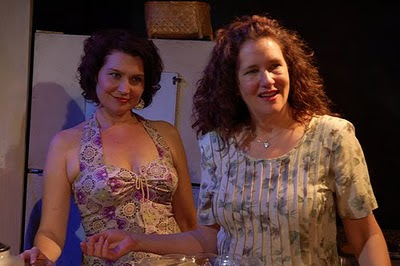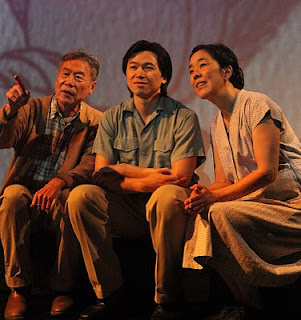By Joe Straw
Something catastrophic happens in which a split second of observation is needed to take note of the moment. Oftentimes, that is not possible in chaotic conditions. Struck by the violent shock wave of an opposing force the options are to either succumb or judiciously leave the area.
Supernova by Timothy McNeil and directed by Lindsay Allbaugh is a peculiar and fascinating play. It is either a metaphor of contemptible cataclysmic events or a simple family drama – you decide. This world premiere play produced by David Fofi and presented by the Elephant Theatre Company in Hollywood, California cast a pernicious light of the living, a snapshot of the collective consciousness.
But what does this all mean?
By definition a supernova is an extremely luminous stellar explosion. It expels the stars material with a velocity and sends shock waves into the interstellar medium.
In this play, Supernova is a watch for sale out of a Soldier of Fortune magazine. And fascinatingly enough the watch manages to change the lives of all the characters.
But, can the audience expect a literal translation when so many things appear to be a complex metaphor of light transmissions?
Wonderful Set Design and Lighting Design by Joel Daavid indicate something is not quite right. Stage right is the family’s home: a working class montage of family living. Stage left is a times seller’s office. (Someone who sell watches.) But there is something wrong with the home set, the doorframe is visibly skewed, the shelves are misaligned as well. There is a door that is seared into the floor as well as a surrealistic window downstage left with a slight view of the darkness below. Stars and galaxies are mysteriously projected into the night sky. But let’s leave those images for the moment.
From a casual perspective the story plays out simply enough.
Mabel Davies (Bonnie McNeil) and her husband John Davies (Tony Gatto) will soon have a dramatic downturn in their relationship. Mabel wants to get her son, Kip Davies (Edward Tournier), a watch for his eighteenth birthday party. Mabel has found a Soldier of Fortune magazine with a page turned down on a specific watch called the Supernova. Her belief is that it is her son’s magazine and he wants a watch for a graduation gift.
The watch costs $299 and John thinks Mabel’s ideal gift is insane. As John is putting on his nice watch, he tells Mabel no watch for his unemployed, drug addict, and loser son. (Well, not those words exactly, but you get the idea.)
Fran (Gina Garrison) a curvaceous divorced neighbor, and visiting, has her sights on Kip. She tells Fran Kip has a blond girlfriend. But, Kip denies this as he only has eyes for women who are at arms length, namely Fran. Even as Mabel is off in dreamland, they are having exaggerated seconds of sex in the kitchen.
At the watch company Ethan (Micah Cohen this night, James Pippi in alternating nights) has just hired Joe Strong (Timothy McNeil) to work the graveyard shift. He is instructed to take the calls and sell watches. Ethan is a devilish boss who demands immediate obedience. (Just the kind of boss everyone likes.)
Later Mabel calls the watch company and strikes up a relationship with Joe. It is a playful relationship that requires many phone calls before the watch is actually sold.
In the meantime, home life is becoming monotonous and unbearable. John is a working stiff who’s angry that his life is about paying everyone’s bills including his father who is in a wheelchair and in a nursing home. John is continuously working to support the household and while he is away, the others play.
And play they do. In the morning hours Kip and Fran are having sex when Kip tells her that there are more pressing problems in the world than having sex with her. Kip tells her “We have to fight to keep our rights as Christians!” (It’s no wonder that Mabel knows enough about Kip to believe the Soldier of Fortune magazine is his.)
“You like simple women Jim Joe? – What are your goals Joe?” - Mabel
Bonnie McNeil as Mabel is a fascinating character. Dour from conflicts at home she seems to do what she wants only giving minimal second thoughts as to how it might affect the others. It is difficult to determine the specific moment, which changes the course of her life.
Gatto as John is sympathetic and pathetic at the same time. How could a man love his son so much to throw food in his face? And on a moments notice, could he toss his wife to the collective of deserted wives in Iowa? Still a carefully crafted performance and one not to miss.
Timothy McNeil as Strong can cower with the best of them. Fighting to find that one woman in his life while maintaining his menial job is his primary objective but what stops him from setting down the phone and running to Mabel? What keeps him in the office?
Garrison as Fran as the sexy neighbor is a charming temptress. She is an intriguing receptor to a physical relationship with both father and son while neglecting Mabel’s needs. It is a physically demanding role and one that has her fighting her own emotional and physical battles. A tremendous job.
Tournier as Kip has a wonderful stage presence. His voice is not mellifluous but measured and angry. He is a man whose sexual needs come first followed by saving the Christian world second. He is strong in his naive convictions. One could question such a worldly perspective from someone turning eighteen years old. Metaphorically, he is the supernova that sends his mental projectiles where the other characters are forced to fight or flee.
Cohen as Ethan is equally remarkable. He is a demanding boss that takes pleasure in controlling the lives of his employees. He is the kind of boss that will write up an employee and get a signature on the write up without having second thoughts.
Tricia (Kelly Elizabeth) also does a fine job in a supporting role indicating it’s the worst birthday party she ever been to. And Moe (Joe Wiebe) as Kips weed smoking friend is equally fine but needs to find the reasons for wanting to hang out with the both of them.
Timothy McNeil writes a play that allows us photo images or snapshots of the destruction of a family in America’s heartland. The characters are no saints in this production, only human, but they all seem to be floundering trying to find their way in life. Waiting for the metaphoric explosion so they can determine what action to take. Still, it’s hard to tell what each of these characters wanted. No one admits to owing or reading Soldier of Fortune or marking the page for the Supernova watch which is mysterious in and of itself and it is not something that is explored or even thought about in this play.
Allbaugh, the director, does a fine job finding the moments that are quite astonishing. Some moments are in need of defining. A lot more mystery and myth would add to this production. Still, she is a remarkable director working with a remarkable cast doing a very exceptional job.
Through June 27th, 2010
Elephant Theatre Company
6322 Santa Monica Blvd.







